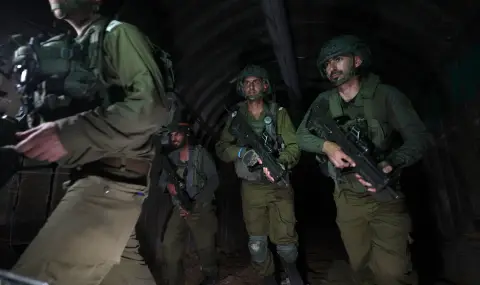After a recent Hezbollah video showing footage of its network of tunnels and underground facilities, experts said the lessons Israel learned from the Gaza tunnel war were valuable, but also that the underground facilities of "Hezbollah" will become more and more threatening, the Israeli news agency TPS reported, BTA reported.
"We have gained enormous experience in Gaza dealing with complex underground threats," Prof. Utzi Rabi, director of the Center for Middle East Studies "Moshe Dayan", told TPS. to Tel Aviv University.
"Unlike the Gaza Strip, which is a plain with sandy soil, Lebanon is covered in rocks and is an extremely mountainous area, with forested areas in many places," Rabi said. "We are talking about tunnels 40-80 meters deep, built under solid rock... This is very different from Gaza." In addition, he added, the tunnels of "Hezbollah" were built with the help of Iran and North Korea and are significantly better built.
"This war gave them an idea of how the Israel Defense Forces (IDF) operates against underground tunnel systems," Rabi said, adding that "Hezbollah" also learning and drawing conclusions from the Gaza tunnel war. However, Tal Berry, head of the Alma Research and Education Center's research department, said that Israel's biggest fear – "a full-scale invasion through tunnels - unlikely", as Israel has been on high alert since October 7.
"Instead "Hezbollah" possibly considering a more targeted operation in a specific area in Israel,'' Berry said. "From what we saw on October 7 with Hamas, tunnels are not even a necessity to launch an invasion." If Israeli forces enter Lebanon, the tactical and logistical tunnels of "Hezbollah" across the country will pose more risks to troops than Gaza. "We are talking about the land of tunnels in Lebanon. There are tactical tunnels all over the country".
The prospect of cross-border tunnels, as well as the presence of "Hezbollah" so close to the border, has northern Israelis on alert. Matan Davidian, a father of four from Shlomi, said that even if the daily rocket fire by "Hezbollah" stop, he would not feel safe if he returned home.
"Our request to the State of Israel is simply not to return to the situation before October 7, when terrorists were in close proximity and waiting to cross the border," said Davidian, who is staying at a hotel in Jerusalem. "We are fully aware that there are attack tunnels of "Hezbollah" in the area. and that they are waiting to attack us as "Hamas" on October 7," Davidyan said. "Without some kind of ground operation to push them out of the border and destroy the tunnels, there is no way my family is going back there."
Nearly 80,000 Israelis were forced to evacuate their homes near the border with Lebanon when in October "Hezbollah" started launching missiles and drones. The leaders of "Hezbollah" said they would continue the attacks to prevent Israelis from returning to their homes. 26 civilians and 19 Israeli soldiers were killed in the attacks.
Israeli officials call on "Hezbollah" to be disarmed and removed from southern Lebanon in accordance with UN Security Council Resolution 1701, which ended the Second Lebanon War of 2006. In December 2018, Israel uncovered six Hezbollah attack tunnels penetrating Israeli territory, built with the support of North Korea and Iran. These tunnels were built despite the continued presence in southern Lebanon of the United Nations Interim Force in Lebanon.
According to a report by the center "Alma" from 2021 the national tunnel network of "Hezbollah" was built on the North Korean model, which includes both tunnels designed to carry out attacks and logistics infrastructure tunnels crisscrossing all of Lebanon. This network includes underground command and control rooms, weapons and supply depots, field clinics and even special shafts used to launch missiles and projectiles of all kinds, including anti-aircraft missiles, the report said.
According to Rabi, the tunnel network of "Hezbollah" was established even before the Second Lebanon War in 2006, and the terrorist group is constantly modernizing it. "Hezbollah" has learned many things related to geology, construction techniques and so on. "Now that the group is building tunnels, they are harder to detect, much more complex and significantly more resistant to bunker bombs," Rabi said.
He added that in the doctrine of "Hezbollah" to store its underground resources in civilian areas. "This is how they protect themselves from Israeli air power. Thus, the only way to deal with such a thing is a ground invasion, which puts a conventional army like the IDF at a disadvantage because it is fighting on its enemy's territory. It's about a whole other city built underground.
"Today we face this challenge with a vast, possibly unprecedented amount of knowledge about underground warfare. We are entering this war with a lot of experience," he noted optimistically.
